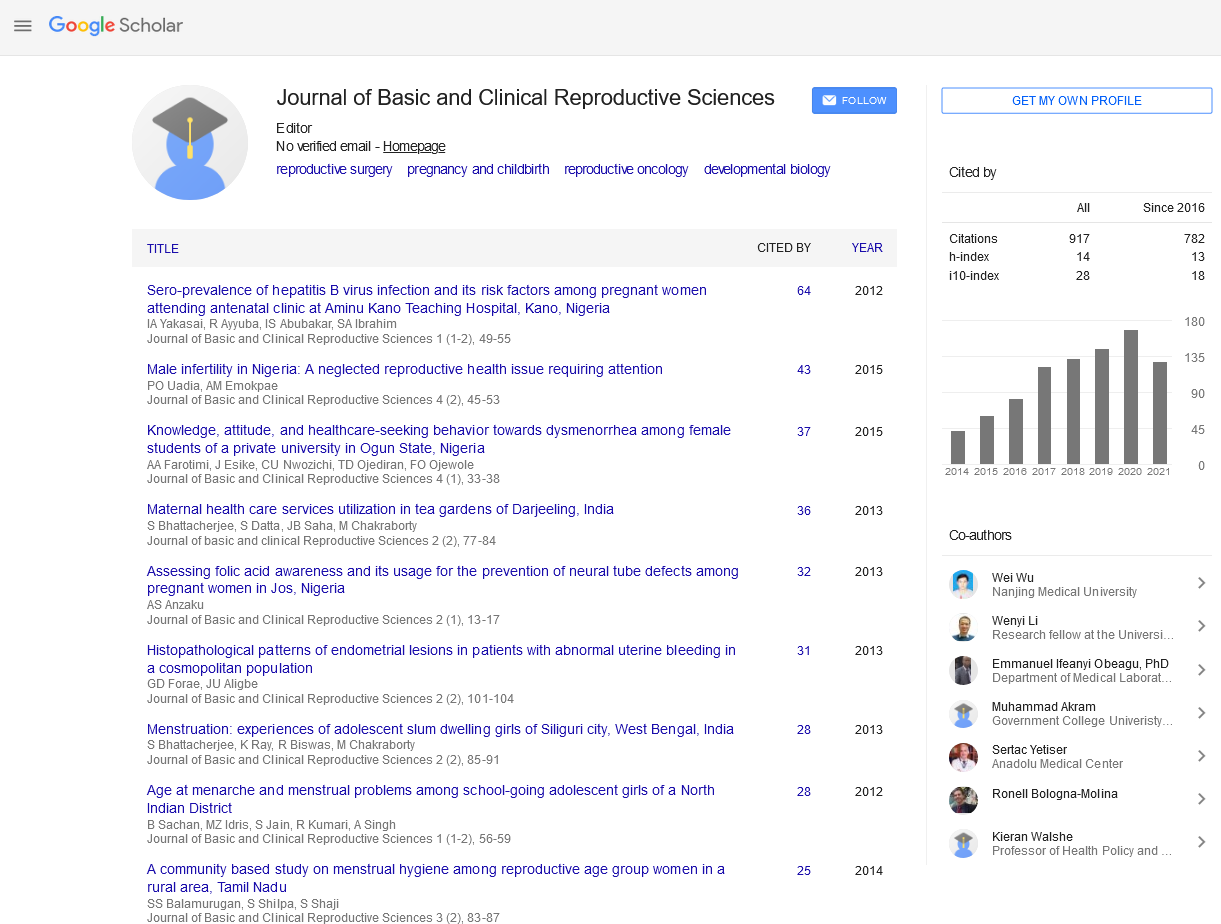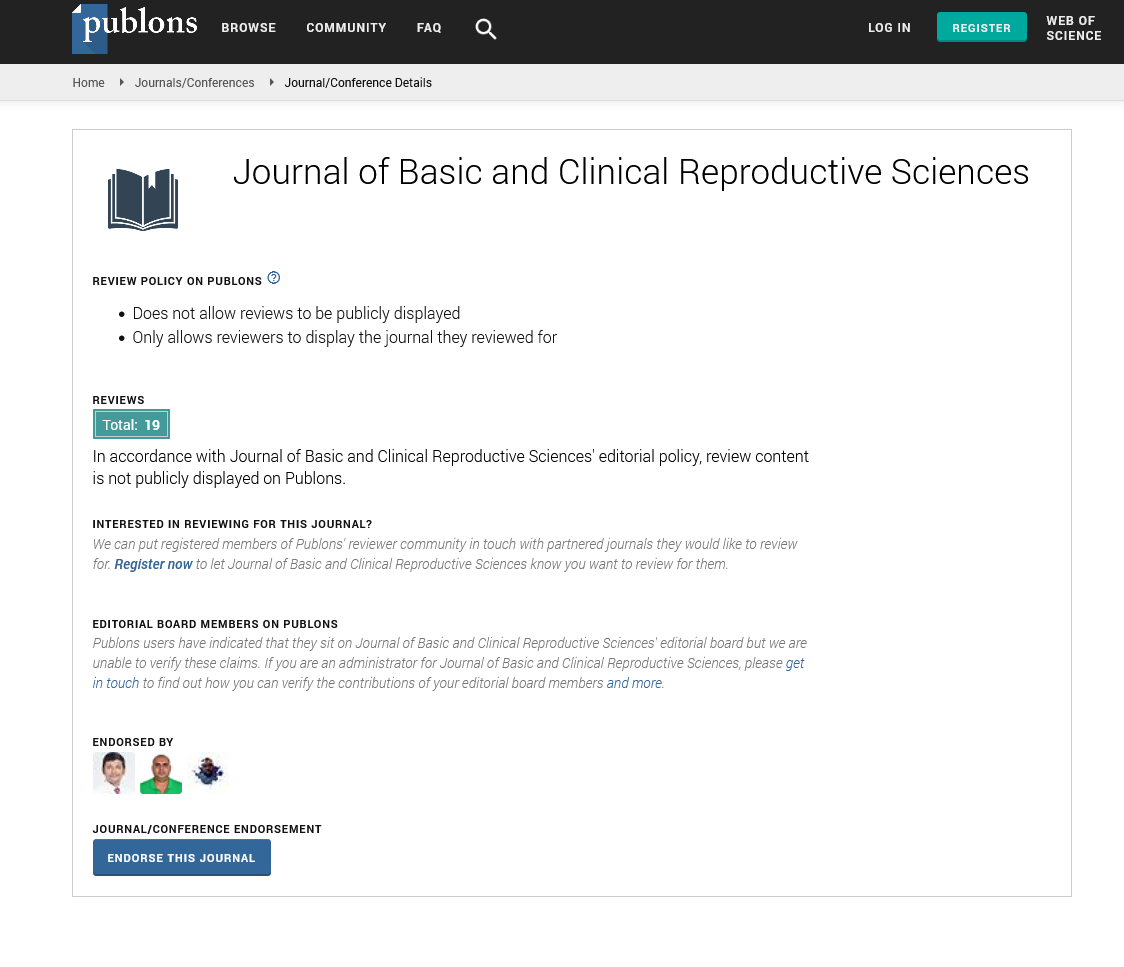Perspective - Journal of Basic and Clinical Reproductive Sciences (2023) Volume 12, Issue 3
The Importance of Prenatal Care: Nurturing Healthy Beginnings
Received: 24-May-2023, Manuscript No. JBCRS-23-101776; Editor assigned: 26-May-2023, Pre QC No. JBCRS-23-101776 (PQ); Reviewed: 09-Jun-2023 QC No. JBCRS-23-101776; Revised: 16-Jun-2023, Manuscript No. JBCRS-23-101776 (R); Published: 23-Jun-2023
This open-access article is distributed under the terms of the Creative Commons Attribution Non-Commercial License (CC BY-NC) (http://creativecommons.org/licenses/by-nc/4.0/), which permits reuse, distribution and reproduction of the article, provided that the original work is properly cited and the reuse is restricted to noncommercial purposes. For commercial reuse, contact reprints@pulsus.com
Description
Pregnancy is an amazing and transformative journey that brings joy and anticipation to families around the world. Ensuring optimal health for both mother and baby is of utmost importance during this critical time. Antenatal care, a comprehensive approach to health tailored to the specific needs of pregnant women, plays a key role in promoting healthy pregnancies, minimizing risks and promoting the well-being of both mother and baby.
Prenatal care
Prenatal care is the term used to describe the assistance and medical treatment given to pregnant women throughout their pregnancy. It entails a series of routine examinations, screenings, tests, and informational sessions with the goal of keeping track of the mother’s and developing foetus’s health. Usually beginning in the first trimester of pregnancy, prenatal care is provided up until delivery.
The benefits of prenatal care
Early detection and prevention: By providing prenatal care, medical experts can see potential health problems early on and take appropriate action to reduce risks and complications. Regular screenings and tests can aid in the early detection of diseases like gestational diabetes, preeclampsia, and sexually transmitted infections, enabling prompt intervention and effective management.
Supporting healthy development: Good prenatal care makes sure that the developing baby obtains the best nourishment and that the womb is a healthy environment. The baby’s growth, heart rate, and general development are monitored through routine check-ups, ensuring that any problems are quickly taken care of.
Education and counselling: As part of prenatal care, pregnant women get sessions that educate them on a range of subjects, including breastfeeding, exercise, nutrition, birthing preparation, and baby care. Such information enables moms to make wise decisions and embrace healthy lifestyle choices, thereby affecting both their own and their children’s wellbeing.
Emotional support: Being pregnant results in important physical and psychological changes. Prenatal care offers a comforting setting where women can talk to medical professionals about their worries, fears, and anxieties. This emotional support can reduce stress and improve the general well-being of mothers.
Components of prenatal care
Regular check-ups: As part of prenatal care, pregnant women are required to make a number of scheduled visits to their doctors. During these appointments, medical personnel check the baby’s heartbeat, examine foetal growth, test blood pressure, and keep track of weight gain. In addition, mothers can talk about any worries or inquiries they may have at these check-ups.
Diagnostic exams and screenings: Prenatal care involves a variety of examinations and screenings meant to spot any potential hazards or anomalies. These could involve blood testing, ultrasounds, genetic studies, and infection tests. These diagnostic devices support the early identification and treatment of any potential problems.
Nutritional advice: For the foetus’s growth and development to proceed as smoothly as possible during pregnancy, proper nourishment is essential. Prenatal care experts give advice on eating well, stressing the need to get enough vitamins, minerals, and other critical elements. They might also offer advice on avoiding particular foods and chemicals that might be harmful to the unborn child.
Exercise and lifestyle recommendations: Prenatal care practitioners give advice on appropriate workout routines and other activities that support healthy pregnancy and mother health. They also offer advice on avoiding bad practices including smoking, drinking, and using drugs.
Birth planning and preparation: Prenatal care provides expectant parents with the opportunity to discuss their childbearing wishes and create a birth plan. Health care providers can educate about distant delivery options, pain management methods, and possible complications. This preparation allows parents to make informed decisions and feel more assured about the upcoming birth.
Conclusion
A healthy pregnancy is based on prenatal care, which is advantageous to both expectant women and their unborn children. It gives expectant parents important medical care, early warning of potential problems, and an abundance of information and direction. One can invest in the health and well-being of future generations by supporting prenatal care. Let’s work to make prenatal care accessible, inclusive, and thorough so that every woman who is expecting can get the assistance they require to give their kid a healthy start.


